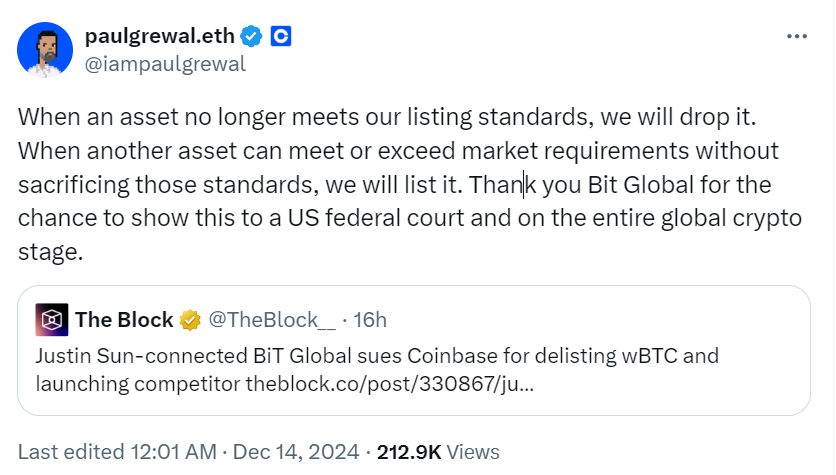Coinbase Legal Trouble – Coinbase Faces $1 Billion Lawsuit Over Wrapped Bitcoin Delisting
Coinbase Legal Trouble – Coinbase, one of the world’s leading cryptocurrency exchanges, is currently embroiled in a lawsuit filed by BiT Global Digital, accusing the platform of engaging in anticompetitive behavior following the delisting of Wrapped Bitcoin (wBTC) in November. The lawsuit, which seeks more than $1 billion in damages, alleges that Coinbase’s actions were strategically designed to promote its own competing Bitcoin-based token, Coinbase BTC (cbBTC), by removing wBTC from its platform.
The Allegations: Monopolization of the Wrapped Bitcoin Market
BiT Global Digital claims that Coinbase’s decision to delist wBTC undermined the market for wrapped Bitcoin and gave an unfair advantage to cbBTC, which was introduced shortly after the delisting. According to the lawsuit, Coinbase’s decision to halt trading for wBTC violated the Sherman Antitrust Act, with the exchange accused of monopolizing the wrapped Bitcoin market. BiT Global alleges that Coinbase used predatory tactics, including issuing false statements about wBTC’s compliance with Coinbase’s listing standards, to damage its market position and steer consumers toward its newly launched cbBTC token.
In response to the lawsuit, Coinbase’s Chief Legal Officer, Paul Grewal, defended the exchange’s actions. Grewal emphasized the platform’s commitment to high listing standards, stating on social media platform X that when an asset fails to meet these standards, it will be delisted. “When another asset can meet or exceed market requirements without sacrificing those standards, we will list it,” Grewal wrote, stressing that Coinbase’s decisions are made to protect the integrity of the exchange and its users.

Industry Backlash: Transparency Concerns
Despite Coinbase’s defense, Grewal’s remarks have received significant backlash from the cryptocurrency community. Justin Sun, the founder of Tron (TRX), questioned the transparency of Coinbase’s actions, particularly in light of previous statements made by Coinbase CEO Brian Armstrong. Armstrong had previously stated that the exchange is “asset agnostic” and believes that consumers should have the freedom to choose the assets they wish to trade. This apparent contradiction between the company’s stance on asset neutrality and the delisting of wBTC has raised concerns among some industry insiders about Coinbase’s true motives.

The Legal Proceedings
The lawsuit was filed by Kneupper & Covey, a law firm representing BiT Global Digital, in the United States District Court for the Northern District of California. The complaint further criticizes Coinbase for onboarding memecoins onto its platform while questioning the compliance of wBTC with its listing standards. This timing, along with the release of cbBTC, has led many to believe that the delisting of wBTC was part of a larger strategy to dominate the Bitcoin-backed token market.
As the legal battle continues, the outcome of the lawsuit could have significant implications for how cryptocurrency exchanges manage token listings and whether regulatory scrutiny of their practices intensifies.
Disclaimer: This article is for informational purposes only and does not constitute investment advice. Cryptocurrencies and stocks, particularly in micro-cap companies, are subject to significant volatility and risk. Please conduct thorough research before making any investment decisions.















Leave a comment